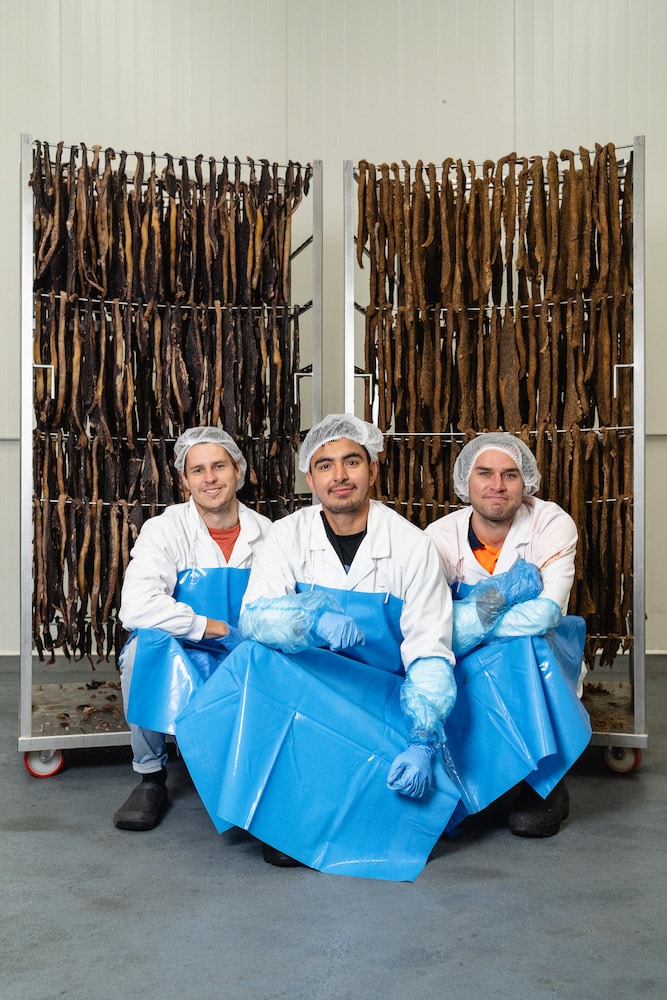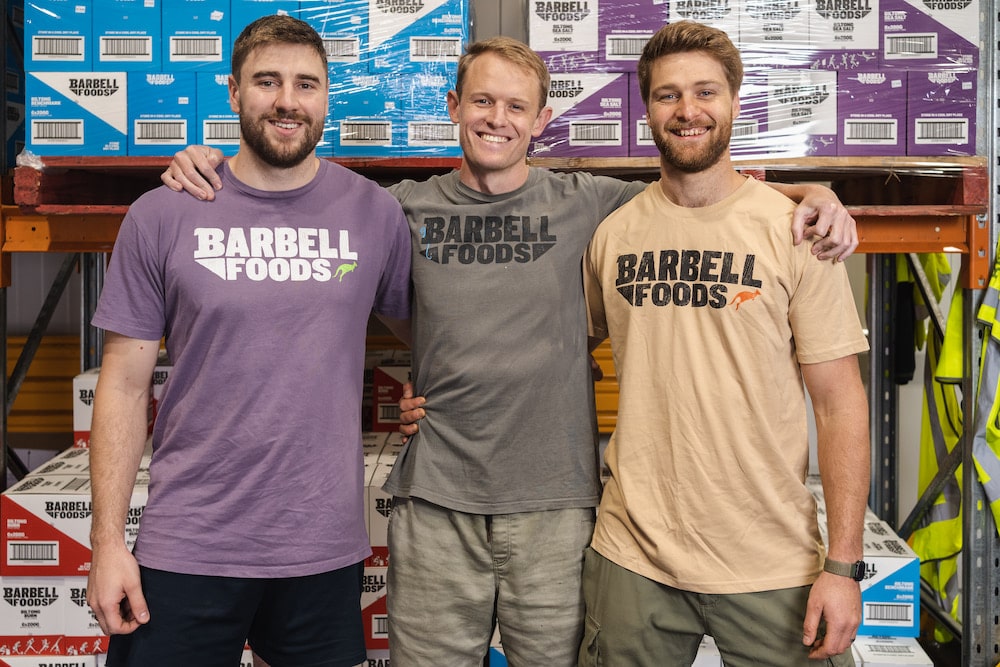At the back of a large, unassuming warehouse in Hume, every month Barbell Foods’ million-dollar production line currently churns out two-and-a-half tonnes of biltong – an African style of air-dried steak.
Upstairs, their office has the playful feel of a modest, stripped back start-up; their lunchroom houses a pool table, darts board, a handmade wooden dining table with a ‘barbell’ inlay. It will soon be capped off with a mural reading “keep it real”.
Six years after Barbell Foods was founded, they’re now a well-established brand stocked throughout Australia – a far cry from what started out as a hobby for co-founder Rory Rathbone.
The journey began when Rory, a South African man, started making biltong at home in his early 20s.
Taking a big batch on a camping trip with a dozen of his mates – who included eventual Barbell co-founders Luke Rathbone, Tom Hutchison, and Matt Laing – it was an immediate hit.
“The product was just so awesome,” Rory said. “The utility of it, it doesn’t need refrigeration, it’s satiating, no cooking; it’s a no brainer for camping.”
From there, his brother Luke came on board, and they began making and selling biltong to family and friends.
“Tom was our best customer,” Rory smiled.
“It was nice and cheap back then, they didn’t have their margins right, I was buying it at cost,” Tom responded.
The home-made Biltong proliferated through Canberra’s rugby community before Rory and Luke decided to commercialise it.
In mid-2016, the brothers moved into a sharehouse with Tom and Matt, who quickly came aboard – Rory credits that as the “spark” for going commercial.
“We asked these guys if they wanted to join, and they all came in,” he said.
Living in the house they ran the business out of, their living room was transformed into a makeshift warehouse.
“We had shelving there, we would ship from there, we would get deliveries to the sharehouse, and we were the forklifts,” Rory said.
From there, they moved into a humble kitchen space at Lyneham where they “grinded” until reaching the point where they were selling as much as they could make.
“We’d validated that people loved the product and we were selling it throughout Canberra,” Tom said, “but for us to take it to the next level, we had to improve our manufacturing capabilities.”
At a crossroads, they decided to raise capital and expand operations.
Eventually, after 18 months on negotiations, they acquired just shy of $1 million from “20 to 30 investors”, which allowed them to fit-out what is now their Hume factory.
Having been there for three years, the business employs four full-timers and a few part-timers, who work alongside the four founders.
Now well established throughout Canberra, their aspirations involve expanding nationally, and eventually exporting.
‘Ancient’ food just meat, spices, and vinegar

At its essence, making biltong is a very simple, ancient process that could even be done outdoors should the situation call for it.
“The product is literally meat, spices, and vinegar; that’s it,” Rory said.
For Tom, the biltong serves as a healthy snacking alternative to typical “health foods of the nation”, or for the more health-conscious, tuna cans and protein shakes.
“That’s our little niche on the grocery shelves,” he said.
READ MORE: Food for thought: Canberra is third healthiest city in the world
The uncomplicated manufacturing process allows the end product to be a true showcase of the organic, grass-fed, and regeneratively farmed beef they source.
“There came a point early on the business where we had to decide amongst the four of us as to what industry we want to support, and what type of meat we’re willing to buy,” Rory said.
From then on, the team have ensured sustainability and quality are two cornerstones of their product.
In a nutshell, regenerative beef farming involves herding the cattle in a way that replenishes the environment and builds up the soil by moving the cattle across paddocks to mimic the way they would naturally migrate.
With their holistic approach to sourcing meat, the team plan to continue down that path with a line of organ-based snacks or supplements coming down the pike.
“We like the philosophy of nose-to-tail eating,” Tom said. “When our ancestors would kill an animal, they would use all of it.”
Get all the latest Canberra news, sport, entertainment, lifestyle, competitions and more delivered straight to your inbox with the Canberra Daily Daily Newsletter. Sign up here.



